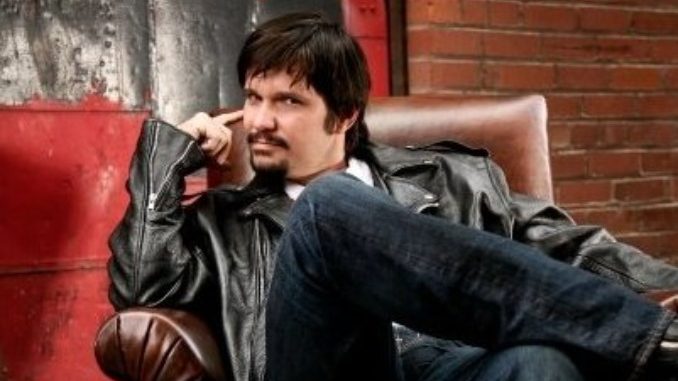
Play Dead: An Exclusive Interview with Ted Dekker
Ted Dekker’s latest novel, Play Dead, just released and is his first solo thriller in nine years. Josh Olds recently talked with Ted in this Life is Story exclusive. Play Dead is available on Amazon or at the Ted Dekker store.
Josh Olds: Where did the idea for Play Dead come from?
TED DEKKER: In 1994, three teenagers were convicted for the brutal murder of three 8-year-old children in satanic fashion. The accused became known as the West Memphis Three. All three were convicted, their lives all but destroyed. Eighteen years later, DNA evidence confirmed that none of them were present at the crime and they were released.
What struck me the most about the documentary that covered the case was the anger some of the parents of the slain children expressed toward the accused over those eighteen years. They wanted revenge which they called justice. Understandably so. But that bitterness ultimately destroyed their lives as much as those accused. So much destruction.
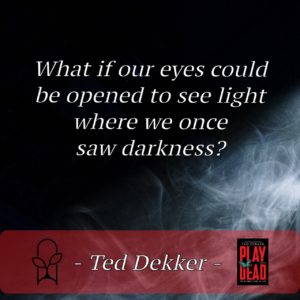 And here’s the thing: the anger that destroyed them was based on false perception. Based on illusion. The evidence on which they had pinned their justification for rage turned out to be false.
And here’s the thing: the anger that destroyed them was based on false perception. Based on illusion. The evidence on which they had pinned their justification for rage turned out to be false.
That got me wondering what would happen if I woke up one day and discovered that all of my own grievances were based in illusion. What if I realized that all of the darkness that I’ve ever seen is only because my perception has been distorted?
What if I could look at any event I think happened and offer it grace and love rather than judgment and fear?
They say that FEAR is False Evidence Appearing Real. What if much of our lives are based on false evidence appearing real, which puts us in a relationship with fear that masters us? What if our eyes could be opened to see light where we once saw darkness?
So I wrote Play Dead, a novel with twists and turns that go deeper and deeper, much like the twists and turns in the story of our own lives. As we are willing to reconsider evidence, those turns lead us to a new experience of reality which may be quite different than what we once believed. It’s a fun, wild ride that has us guessing at every turn as we contemplate how we live our lives in fear of so much compelling evidence that may or may not be real.
Josh Olds: Do you foresee the type of virtual reality technology that’s in Play Dead becoming a reality?
TED DEKKER: Absolutely. It will take some time, but perhaps sooner than we might think, we will be able to enter a virtual reality that is visually indistinguishable from the world we live in. It will require some form of neural bypass which sends signals for sensation directly to the brain without dependence on our sensory receptors, but everyone in the field knows it’s coming. Visual VR is only the first step and it’s progressing very quickly.
Josh Olds: Alternate realities seem to be a recurring theme in your writing. Why is that such a fascination for you?
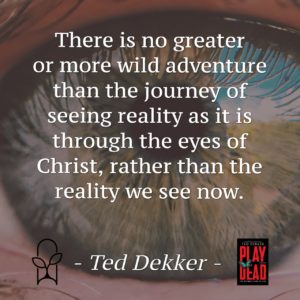 TED DEKKER: I’m not really that interested in alternate realities as much as reality itself. Jesus made it clear that we can see this world differently, something he called “seeing the kingdom” which is already deep within us to be experienced, much like a banquet of unfolding delights. But we’re blind, you see? So what’s it like to see reality with the eyes of Christ rather than as we see it now? It requires a kind of death to the old way of seeing reality so that one can see with new eyes. Jesus calls this taking up the cross, or denying your entire life. New wine (true sight) cannot be held in old wineskins (our current way of seeing.)
TED DEKKER: I’m not really that interested in alternate realities as much as reality itself. Jesus made it clear that we can see this world differently, something he called “seeing the kingdom” which is already deep within us to be experienced, much like a banquet of unfolding delights. But we’re blind, you see? So what’s it like to see reality with the eyes of Christ rather than as we see it now? It requires a kind of death to the old way of seeing reality so that one can see with new eyes. Jesus calls this taking up the cross, or denying your entire life. New wine (true sight) cannot be held in old wineskins (our current way of seeing.)
If there is an ‘alternate’ reality, it’s the one we see with blind eyes now, born in fear. But Jesus invited the human race to follow him into a whole new way of seeing and experiencing reality through a process of death and rebirth. That way of being flows with love which knows no fear. Clearly, religion hasn’t led us to this way of being yet, so we’ve come up with dogma that punts it into the afterlife, thereby negating the way of love in this life.
There is no greater or more wild adventure than the journey of seeing reality as it is through the eyes of Christ, rather than the reality we see now.
Josh Olds: What is your view of reality?
TED DEKKER: On one hand, reality is what you experience it to be. It’s real to you, but that doesn’t mean it’s ultimately real.
Only metaphor can describe reality as it is, which is why Jesus used parables full of mystery. The kingdom of heaven (the truest reality) is like . . . This is because that reality is experienced more than described through dogma. So rather than telling you what I think reality is, I invite you to discover it for yourself. To do so, we all get to let old ideas die. We all get to Play Dead, so to speak.
Josh Olds: Play Dead is your first solo novel in quite some time—the last one being Rise of the Mystics—why the long gap?
TED DEKKER: My journey has been and continues to be letting go of who I thought I was (including my role as a writer) so that I can see who I’ve always been. Once we say yes to that journey, anything can happen. In my case, it meant laying down writing for a while without knowing if I would ever write again. It was hard. It broke me down.
Play Dead is that story of release and surrender and it’s not over yet.
Josh Olds: A fan question from Caitlyn Lutz: We all know your writing has changed a lot from its early days. Would you group your books into “seasons” where you had a particular theme or style for a while?
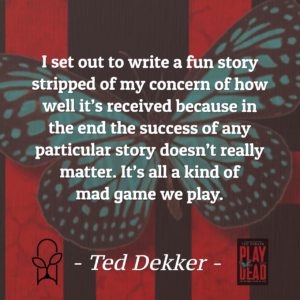 TED DEKKER: Absolutely. I’ve always written to explore the deeper themes of my own experience. For a while, I got sucked into writing stories that I thought would sell well—a form of giving readers what I think they want. That eventually gave way to taking a deep dive into examining my own beliefs even if it made readers uncomfortable, ie. The Rise of the Mystics. With Play Dead, I set out to write a fun story stripped of my concern of how well it’s received because in the end the success of any particular story doesn’t really matter. It’s all a kind of mad game we play.
TED DEKKER: Absolutely. I’ve always written to explore the deeper themes of my own experience. For a while, I got sucked into writing stories that I thought would sell well—a form of giving readers what I think they want. That eventually gave way to taking a deep dive into examining my own beliefs even if it made readers uncomfortable, ie. The Rise of the Mystics. With Play Dead, I set out to write a fun story stripped of my concern of how well it’s received because in the end the success of any particular story doesn’t really matter. It’s all a kind of mad game we play.
So yes, each of my stories has been written in a season of my own learning as I take the journey through the same valleys and over the high passes we all navigate.
Josh Olds: Play Dead is unique in that it’s published under your own publishing imprint. Why did you go the indie publishing route for this book?
TED DEKKER: I’m just playing the game differently with this book. The industry has changed radically over the last five years and I’m simply forging new paths which may also benefit others who follow.
Josh Olds: What’s the major difference for you between traditional publishing and indie publishing? Are you done with traditional publishers?
TED DEKKER: Distribution is the key for any good novel and traditional publishers used to offer a clear plan for distribution through bookstores. That’s changing as more and more content is distributed directly to the consumer. I wouldn’t say either is a better way, only that the old way of doing things isn’t as efficient as it once was and so both traditional and indie publishers are trying to figure out how to get their books in front of their audience. As such, everyone is experimenting. As am I.
We will see where it all goes. I’m open to anything.
Josh Olds: As always, I have to ask, what’s the next big Dekker project?
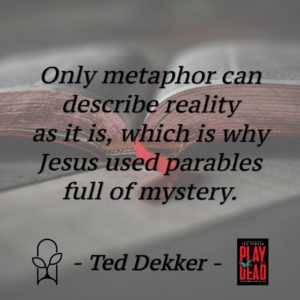 TED DEKKER: Rachelle and I are writing a young adult series about dragon slayers that will be out in October. Kara and I are working on a series of picture books for kids. I’m circling around the sequel to Play Dead.
TED DEKKER: Rachelle and I are writing a young adult series about dragon slayers that will be out in October. Kara and I are working on a series of picture books for kids. I’m circling around the sequel to Play Dead.
Also, Showdown is in preproduction for a movie, intended by the production company as a gateway into the ‘Dekkerverse’, meaning all novels related to the Books of History (19 books including the young adult books.) I’m also in talks with numerous parties who have expressed major interest in Play Dead. We will see how it all unfolds!
